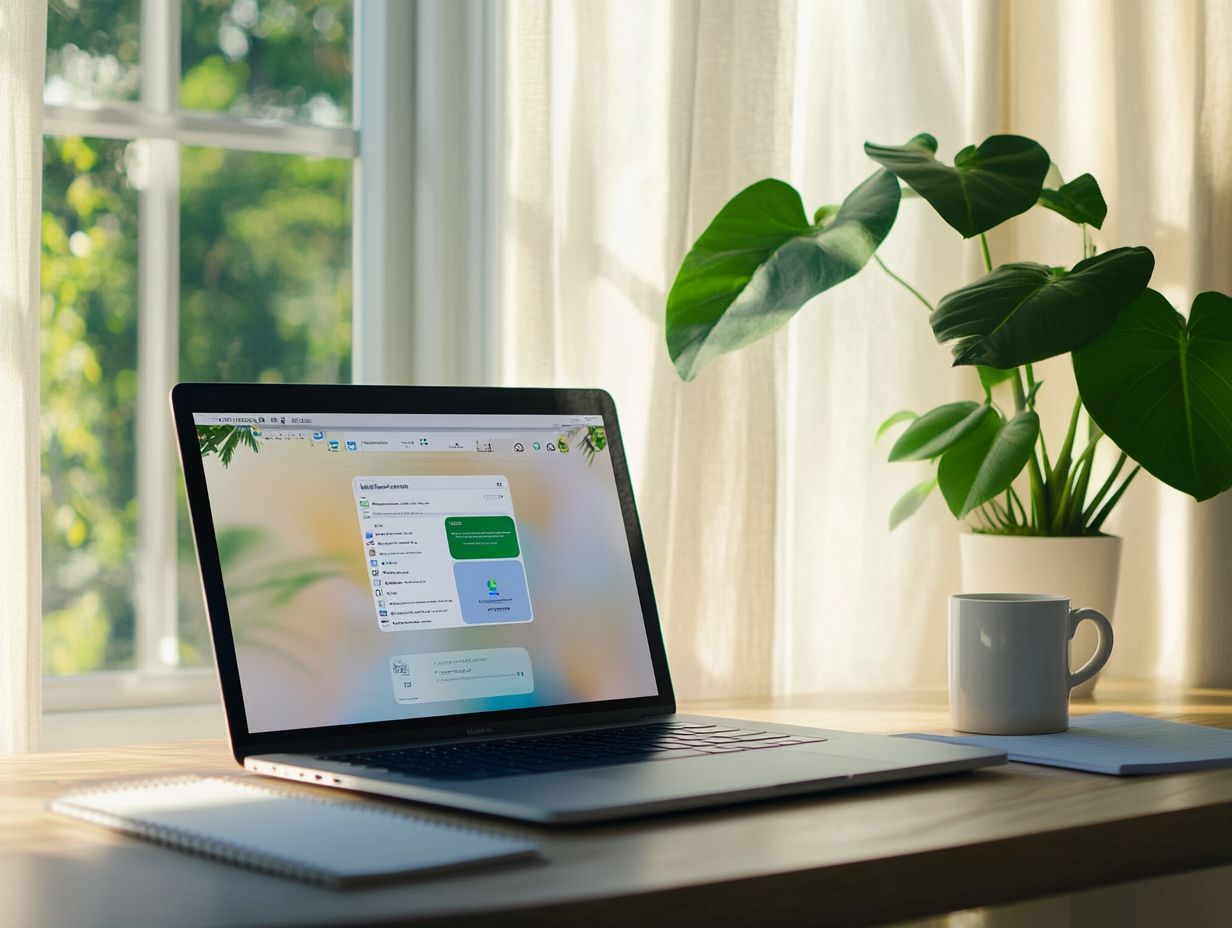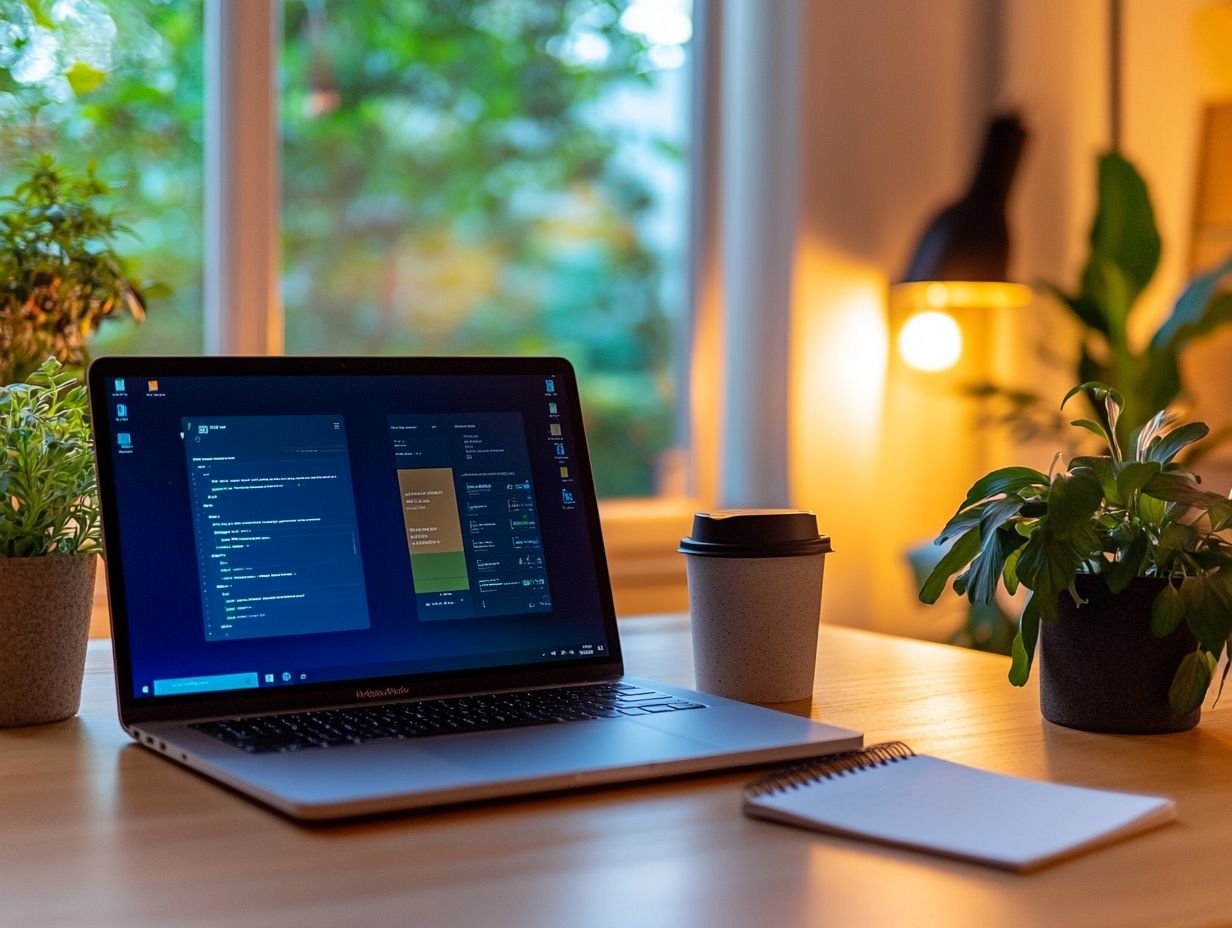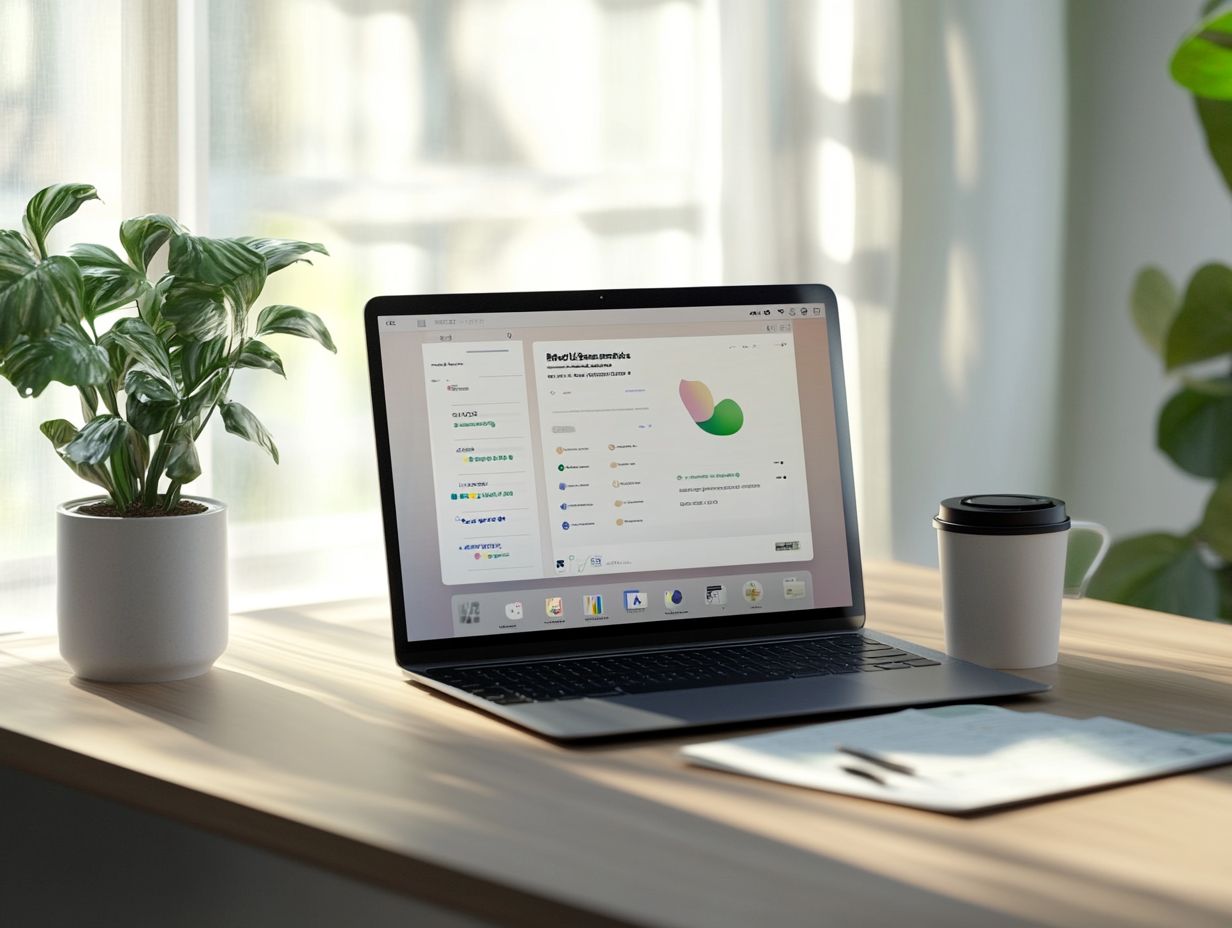10 Tips for Staying Productive and Avoiding Procrastination
Feeling overwhelmed by tasks? You’re not alone! Let s tackle procrastination together. In today s fast-paced world, staying productive can feel like an uphill battle with procrastination lurking around every corner. Whether you’re balancing work, studies, or personal projects, it s crucial to find effective strategies that enhance your productivity.
This article presents ten practical tips to help you set clear goals, create a structured schedule, and eliminate distractions. You will also explore the causes and effects of procrastination, armed with the tools needed to foster a more productive mindset and sidestep burnout.
Dive into these insights and see how small changes can transform your daily life!
Contents
- Key Takeaways:
- 1. Set Clear and Realistic Goals
- 2. Create a Schedule and Stick to It
- 3. Prioritize Tasks
- 4. Take Breaks and Rest
- 5. Eliminate Distractions
- 6. Delegate Tasks
- 7. Use Productivity Tools and Apps
- 8. Stay Organized
- 9. Reward Yourself for Accomplishments
- 10. Practice Mindfulness and Focus
- What Are the Causes of Procrastination?
- How Does Procrastination Affect Productivity?
- What Are the Signs of Procrastination?
- How Can One Overcome Procrastination?
- What Are the Benefits of Being Productive?
- How Can One Stay Consistently Productive?
- What Are the Common Excuses for Procrastination?
- How Can One Develop a Productive Mindset?
- What Are Some Helpful Habits for Staying Productive?
- How Can One Avoid Burnout While Staying Productive?
- Frequently Asked Questions
Key Takeaways:

- Set realistic and specific goals to stay motivated and on track.
- Stick to a schedule and prioritize tasks to avoid wasting time.
- Take breaks, eliminate distractions, and delegate tasks to maintain focus and productivity.
1. Set Clear and Realistic Goals
Setting clear and realistic goals is crucial for managing how you use your time. It gives you the power to pinpoint your desired outcomes and devise actionable plans that pave the way for success in both personal and academic spheres.
One highly effective strategy for goal-setting is the SMART criteria, a way to make sure your goals are clear and reachable. This approach emphasizes that your goals should be Specific, Measurable, Achievable, Relevant, and Time-bound. By articulating your objectives with precision, you can break your aspirations into manageable steps.
For example, instead of simply declaring, “I want to get fit,” you might specify, “I will walk for 30 minutes every morning for four weeks.”
Research featured in esteemed publications like Forbes and Psychology Today reveals that self-awareness and commitment dramatically enhance the likelihood of achieving your goals. Reaching these goals isn t just about setting them it s about cultivating the discipline and insight necessary to see them through to fruition.
2. Create a Schedule and Stick to It
Creating a schedule and sticking to it is an essential strategy for mastering time management. It gives you the power to allocate dedicated focus time for tasks while establishing firm deadlines that boost productivity and curb procrastination.
By embracing various scheduling techniques, such as time blocking where you designate specific chunks of time for particular tasks you can cultivate a structured yet adaptable environment that supports your goals.
The Pomodoro method, which encourages focused work sessions interspersed with short breaks, can enhance your concentration and help prevent burnout. To further elevate this structured approach, consider using organization tools like Trello and Basecamp.
These platforms offer intuitive interfaces for tracking progress, assigning tasks, and collaborating seamlessly with others. These systems form the foundation of a productive routine, but it’s crucial to maintain flexibility and a willingness to adapt your plans.
This adaptability is key to achieving sustained success in any endeavor.
3. Prioritize Tasks
Prioritizing tasks is essential for enhancing your productivity. It allows you to break down responsibilities into manageable components and engage in focused sessions that ensure the completion of your daily non-negotiables.
Understanding the urgency and importance of each task can significantly reduce the feeling of overwhelm. For instance, utilizing the Eisenhower Matrix enables you to categorize tasks based on their priority levels, helping you distinguish between what s urgent and what s truly essential.
This method fosters clarity and focus, giving you the power to invest your time wisely. Having an accountability partner can further reinforce your commitment, making procrastination less tempting.
Breaking down larger assignments into smaller, actionable steps not only alleviates feelings of guilt but also cultivates a sense of accomplishment, ultimately steering you toward positive and productive outcomes.
4. Take Breaks and Rest
Taking regular breaks is vital for maintaining your productivity and staving off mental fatigue. These brief respites allow you to recharge during your work intervals.
This significantly enhances your overall performance once you dive back into your tasks. Employing strategies like the Pomodoro technique a method that involves working for a set time followed by a short break can be particularly effective in structuring these breaks.
This method involves immersing yourself in focused work for 25 minutes, followed by a refreshing 5-minute break. Not only does this enhance your concentration, but it also creates a harmonious balance between work and rest.
You can also reward yourself for completing tasks. This practice reinforces your motivation and commitment to achieving larger goals.
By treating yourself to a small reward after each Pomodoro session, you cultivate a positive feedback loop that transforms work into a more satisfying and less daunting endeavor.
5. Eliminate Distractions
Eliminating distractions is essential for maximizing your focus time and enhancing your creative energy. The right study location and workspace preferences significantly impact your productivity.
Creating an environment tailored to your individual needs can greatly reduce interruptions. Think about incorporating elements like:
- soft lighting
- comfortable seating
- minimal decor
These adjustments foster concentration. You might also consider implementing digital detoxes, such as setting aside designated phone-free hours or using apps that block distracting websites. These strategies can significantly enhance your focus.
By establishing a routine that includes these environmental adjustments, you can cultivate a workspace that boosts your efficiency and resonates with your personal style. This transformation makes productivity not just effective but also an enjoyable experience.
6. Delegate Tasks
Handing off tasks can supercharge your productivity and help you shine in your high-priority goals! Delegating tasks effectively enables you to concentrate on high-priority objectives while harnessing the strengths of your support team for successful project planning.
By distributing responsibilities, you create a more balanced workload and instill a sense of ownership among team members. This often leads to heightened morale and creativity.
To identify the tasks you should delegate, assess the skills and interests of your team, ensuring that each assignment aligns seamlessly with individual strengths.
Appointing an accountability partner is crucial in this delegation process. This partner helps monitor progress, provides encouragement, and keeps everyone focused.
Ultimately, this ensures that all tasks are completed efficiently and effectively.
7. Use Productivity Tools and Apps

Utilizing productivity tools and apps like Trello and Basecamp can truly transform your approach to organization. They help you break down tasks, share progress, and implement effective motivation strategies that lead to consistent performance.
These applications come with features such as:
- customizable boards
- intuitive task assignment
- deadline reminders
All designed to suit various work styles. By promoting collaboration among team members, they ensure everyone stays aligned and accountable, significantly reducing the chances of procrastination.
The goal-setting functionalities allow you to visualize your progress, making it easier to remain focused and motivated.
As you navigate through your tasks and reach milestones, you ll feel a rush of achievement! This collective effectiveness not only streamlines your workflows but also cultivates a proactive work environment.
8. Stay Organized
Staying organized is crucial for mastering time management. It allows you to prioritize tasks and maintain focus during your work sessions. This ensures that your non-negotiables are consistently addressed.
Implement various organization strategies and leverage tools like digital planners, project management software, and specific time slots for tasks to streamline your workflow. For more insights, consider the 5 best practices for avoiding procrastination. Keeping a well-maintained to-do list and categorizing tasks by urgency clarifies your priorities and helps you allocate your time effectively.
This integration of organization with time management boosts your productivity and reduces your tendency to procrastinate. It paves a clearer path toward achieving both your daily and long-term goals.
9. Reward Yourself for Accomplishments
Rewarding yourself for completing tasks creates a positive atmosphere that enhances your motivation. It alleviates any guilt tied to procrastination, fostering a healthier relationship with productivity.
Different types of rewards like a small treat, a fun leisure activity, or even a well-deserved break can instill a sense of accomplishment and reinforce positive habits. The psychological benefits can boost your self-esteem and reduce anxiety, leading to a more resilient mindset in the face of challenges.
Engaging with an accountability partner enhances this reward system. They provide gentle reminders and offer sincere encouragement. Sharing successes together creates a supportive social environment that inspires you to stay committed to your goals.
10. Practice Mindfulness and Focus
Mindfulness boosts your focus and self-awareness while combating mental fatigue and the weight of perfectionism the desire to achieve flawlessness on your productivity.
Incorporate techniques such as meditation and deep breathing exercises to cultivate a sense of calm that sharpens your ability to concentrate. Integrating short, mindful pauses throughout your day can transform your mental state.
For instance, just a few minutes of focused breathing can ground your thoughts and pave the way for clearer decision-making.
Over time, these practices contribute to improved mental health and greater productivity, allowing you to approach tasks with renewed energy and creativity.
What Are the Causes of Procrastination?
Understanding the root causes of procrastination is essential for crafting effective strategies to overcome it. Factors like fear of failure, perfectionism, and the complex mental hurdles involved often lead to feelings of guilt over unmet goals and unfinished tasks.
Alongside these internal battles, external influences like environmental distractions and time constraints can intensify your tendency to delay important tasks. Experts like Kitty Boitnott note that the weight of social expectations can burden individuals, prompting them to shy away from daunting responsibilities. Cindy Stack highlights how a lack of structure in your day can create a vicious cycle of avoidance and anxiety.
By exploring these psychological factors and situational triggers, it becomes clear that a multifaceted approach is essential for effectively tackling procrastination.
How Does Procrastination Affect Productivity?
Procrastination can seriously undermine your productivity, leading to mental fatigue, heightened stress levels, and a dip in your academic performance as deadlines approach. To combat this, consider exploring 7 ways to stay motivated and beat procrastination.
This struggle extends to the professional world, where distractions often cause delays in critical tasks. A study by the American Psychological Association indicates that about 20% of adults consider themselves chronic procrastinators, which can stall your career advancement and diminish job satisfaction.
In academic settings, research shows that students who procrastinate score 3-4 points lower on standardized tests than their more organized peers. By grasping these implications, you can devise strategies to combat procrastination, creating a more productive environment for yourself in all areas of life.
What Are the Signs of Procrastination?
Recognizing the signs of procrastination is crucial for tackling the issue early. Common indicators include avoidance behaviors, mental gymnastics to rationalize your delays, and nagging guilt from uncompleted tasks. You may find yourself lost in distractions, like endlessly scrolling through social media or binge-watching your favorite shows, that serve as tempting escapes from your essential responsibilities. To break free from this cycle, consider exploring 10 tips to develop a procrastination-free mindset. Emotional factors, such as fear of failure or perfectionism, can also trap you in a self-doubt cycle that hampers your productivity.
To enhance your self-awareness, it s beneficial to keep a daily log that captures your tasks and feelings about them. This practice allows you to clearly identify your procrastination triggers. Reflecting on these patterns can empower you to confront your challenges head-on, paving the way toward more constructive habits and improved time management.
How Can One Overcome Procrastination?

Overcoming procrastination demands a variety of strategies. You can harness motivation strategies, break tasks into manageable pieces, and enlist the support of an accountability partner to solidify your commitment to your goals.
To effectively implement these strategies, start by setting clear, achievable goals that you can tackle progressively. For example, the Pomodoro technique, which involves working in short bursts of 25 minutes followed by a break, can help improve focus. For more tips, consider exploring 10 ways to kickstart your day and avoid procrastination. This method not only enhances your concentration but also alleviates the overwhelming nature of larger projects.
Creating a distraction-free workspace whether by decluttering your physical space or minimizing digital notifications can significantly amplify your focus. Seeking accountability from a friend or colleague can give you the important push you need, reinforcing your commitment to making progress.
Be sure to treat yourself for completing tasks, like indulging in a favorite treat or enjoying some relaxation time. These little incentives can ignite your motivation and help maintain your momentum. Act now to start your journey toward productivity!
What Are the Benefits of Being Productive?
Being productive offers a multitude of benefits, from improved academic performance to a rewarding sense of achievement, all stemming from a steadfast commitment to your goals. Research indicates that when you prioritize productivity, you re likely to experience a notable boost in your overall well-being and mental health.
For instance, a study published in the Journal of Happiness Studies found that individuals who skillfully manage their time and tasks report higher life satisfaction and experience lower levels of stress and anxiety. In fast-paced industries, professionals who embrace productivity techniques often discover they can maintain focus and feel less overwhelmed.
This not only enhances their work performance but also cultivates a healthier work-life balance, nurturing a more optimistic outlook on both personal and professional challenges.
How Can One Stay Consistently Productive?
Staying consistently productive requires you to master time management, implement dedicated work sessions, and utilize organizational tools that enhance self-awareness while supporting your commitment to long-term goals. Consider exploring 7 ways to stay on task and avoid procrastination for effective strategies.
To achieve this, you might explore various techniques, such as the Pomodoro Technique, which breaks your work into manageable intervals, or time-blocking, where you set aside specific hours for different tasks. These strategies not only help you maintain concentration but also assist in identifying your peak productivity times.
Leveraging digital tools like task management apps can provide you with a clear visual of your progress and help you organize your responsibilities effectively. Importantly, setting aside time for regular reflection allows you to assess which strategies are working and where adjustments may be needed, ensuring that your approach to enhancing performance remains dynamic and tailored to your unique needs.
What Are the Common Excuses for Procrastination?
Common excuses for procrastination often arise from deeper issues like a fear of failure and perfectionism. You may find yourself engaging in overthinking, crafting elaborate rationalizations that justify delays and inaction.
These justifications can take various forms, from insisting you need more time to contemplate your options to convincing yourself that you thrive only under pressure. Such rationalizations act as a protective shield, guarding against the discomfort of uncertainty and self-doubt.
It’s not unusual to tell yourself that the timing isn’t right or that a lack of resources stands as a legitimate barrier. Recognizing these psychological roots can be your first step toward overcoming them.
By acknowledging the fears that fuel these excuses, you empower yourself to reframe your mindset. Set manageable goals, celebrate small victories, and watch as you build momentum and, ultimately, confidence.
How Can One Develop a Productive Mindset?
Cultivating a productive mindset is essential for your long-term success. It requires strategic motivation, self-awareness, and a steadfast commitment to goals that resonate with your personal values and aspirations.
To achieve this, consider employing techniques such as visualization. By creating a vivid mental picture of your desired outcomes, you ll find your confidence and clarity significantly boosted. Incorporating affirmations, or positive statements that help boost your confidence, into your daily routines serves as a powerful reminder of your capabilities and intentions, reinforcing a positive self-image.
Regular self-reflection allows you to assess your progress, adjust your goals, and ensure that your current actions align with your core values. This thoughtful approach not only sustains your motivation but also guarantees that your journey toward achieving your goals remains rewarding and true to who you are.
What Are Some Helpful Habits for Staying Productive?
Cultivating helpful habits is essential for your productivity, including effective task prioritization and maintaining focus time. Consider exploring 7 techniques for staying focused and utilizing organizational tools that streamline your workflows.
These foundational habits enhance your productivity. For instance, starting each day by outlining specific tasks provides you with direction and motivation, making it easier to stay on track. Utilizing tools to help you stay focused can further support this effort.
Equally important is the organization of your workspace; a tidy and orderly environment minimizes distractions, allowing for improved concentration.
Scheduling regular breaks throughout the day is crucial in combating burnout. Techniques like the Pomodoro Technique working for 25 minutes followed by a 5-minute break help you maintain energy levels while fostering creativity and focus.
Integrating these strategies into your daily routine can create a balanced approach to increased efficiency. Start implementing these strategies today!
How Can One Avoid Burnout While Staying Productive?
Avoiding burnout while maintaining productivity is vital for your long-term performance. You need to be mindful of your thoughts to recognize when mental fatigue is creeping in. Implement strategies like rewarding yourself for completed tasks and exploring 10 ways to stay organized and productive, as well as scheduling regular breaks to recharge.
Establishing clear boundaries in both your personal and professional life is essential. This creates a protective buffer against overwhelming demands. Incorporating mindfulness techniques into your routine can foster a centered mindset, allowing you to focus on tasks without the relentless stress nagging at you.
Striking a balanced work-life dynamic is key for restorative downtime, which is vital for mental rejuvenation. Engage in self-care activities, whether it s exercise or indulging in hobbies; these not only enhance your well-being but also sustain your overall productivity. This way, you can tackle challenges with ease while preserving your mental health.
Frequently Asked Questions

What are some tips for staying productive?
1. Set specific, achievable goals each day.
2. Create a schedule or to-do list to stay organized.
3. Take breaks to recharge your mind.
4. Eliminate distractions by, for example, turning off phone notifications.
5. Prioritize tasks, working on the most important ones first.
6. Keep your motivation high by focusing on your end goal.
7. Delegate tasks when possible to lighten your load.
8. Use productivity apps to help you stay on track.
9. Reward yourself for completing tasks or hitting milestones.
10. Ask for help or advice when you need it.
How can I avoid procrastination?
Break tasks into smaller, manageable pieces.
Set deadlines for yourself and stick to them.
Identify why you procrastinate, whether it’s fear or boredom.
Hold yourself accountable by sharing your goals with someone.
Try the 5-minute rule: commit to just starting a task for five minutes, and you may choose to continue.
Minimize distractions like social media or TV.
Find a workspace that promotes focus and productivity.
Use positive self-talk to stay motivated.
Take regular breaks and reward yourself for completing tasks.
Instead of dwelling on past procrastination, focus on moving forward.
How often should I take breaks while working?
Take breaks when you need them. Listen to your body and mind; step away when you start feeling fatigued or unfocused.
Balance is key. A good rule is to take a short break (5-10 minutes) after every hour of work.
What are some common distractions to avoid?
Avoid distractions like social media, emails, phone calls, and unnecessary chats with coworkers.
Identify personal distractions and find strategies to reduce them.
How can delegating tasks help with productivity?
Delegating tasks frees up your time for more important work.
It allows you to benefit from the skills of others, making tasks more efficient.
What should I do if I m feeling unmotivated?
If unmotivated, change your environment to spark inspiration.
Break the task down into smaller parts or seek support from others.
Don t forget to take breaks and reward yourself for completing tasks!






